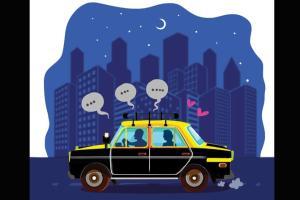My first solo taxi felt exactly as marvelous as I'd imagined. The taxi driver began talking to me amiably, asking me what I did, how my Hindi was so good and so on

Illustration/Uday Mohite
![]() Fantasies of grown-up life can sometimes involve very precise and somewhat peculiar details. One of those details in my case involved being able to stand at a kerb and hailing a taxi, that iconic Bombay kaali-peeli Premier Padmini—which are now to be phased out. To take a taxi just like that, when you could be doing the dutiful and frugal thing of taking mass public transport seemed luxurious, liberated and louche, which surely must be the full form of la-la-la.
Fantasies of grown-up life can sometimes involve very precise and somewhat peculiar details. One of those details in my case involved being able to stand at a kerb and hailing a taxi, that iconic Bombay kaali-peeli Premier Padmini—which are now to be phased out. To take a taxi just like that, when you could be doing the dutiful and frugal thing of taking mass public transport seemed luxurious, liberated and louche, which surely must be the full form of la-la-la.
ADVERTISEMENT
My first solo taxi felt exactly as marvelous as I'd imagined. The taxi driver began talking to me amiably, asking me what I did, how my Hindi was so good and so on. The difference in our genders, ages (I was 21 he was middle-aged) and class, did not seem to have a significant weight for the short duration of that ride, however overwhelming its essentially reality, outside the cab.
Soon, the cab-driver shared he was feeling "bahut zyada tension". As expected I asked why. As not expected he said he felt his wife was cheating on him, with his friend, a suspicion that took root when she gave blood during the friend's hospitalisation. Now, he noted, she was stingy with affectionate gestures he requested like "tanik sar pe haath pher do". I was agog at these filmi intensities and adult confidences. Being woke was not too fashionable in my youth so I didn't lecture him about toxic masculinity but tried to prove he was being unreasonable, in vain. The capacity to share fleeting intimacies with urbane warmth and interest, is something I learned in Bombay taxis, and it's formed the basis of my work. Many such intimate conversations followed. Once I met a cabbie who ran away to Bombay after seeing Dev Anand in Taxi Driver—so one could say he was living his dream. I argued with drivers who felt dubious about my financial state, work choices and marital status, heard tales of riches to rags, or cabs, rather; of jobs lost to the mill strike, was asked by one cabbie if I'd like to go to his friend's place in Mahim, get stoned and you know, 'hang out'. It must be my deep belief that city life was meant to be unexpected, that I felt awkward but not particularly alarmed or offended by this. He accepted my refusal with alacrity, and the comment, "I just asked because you seem unusual, very 'free" "—apparently not like other women" and "you know, driving a tax gives the chance to observe a lot of different women". Indeed we do bring many intimacies with companions, conversational and otherwise, into cabs and reveal ourselves.
Cab drivers who know their way around, encountering and belonging while not belonging to hidden streets and constant strangers, acquire an easy sophistication and their cabs become a mobile democratic republic. App cabs initially felt impersonal and densely silent to me. GPS allows us to not know the world, or ourselves in relation to it. But, as they become the new normal, they give way to different conversations, a hesitant intimacy. And I learn a lot of new music from younger Uber drivers. Eventually, older spirits, abandon their crumbling bodies, hail a cab to ride in the passenger seat with the new and, in its way, the city keeps these islands of connections alive and simmering.
Paromita Vohra is an award-winning Mumbai-based filmmaker, writer and curator working with fiction and non-fiction. Reach her at paromita.vohra@mid-day.com
Catch up on all the latest Crime, National, International and Hatke news here. Also download the new mid-day Android and iOS apps to get latest updates
 Subscribe today by clicking the link and stay updated with the latest news!" Click here!
Subscribe today by clicking the link and stay updated with the latest news!" Click here!






